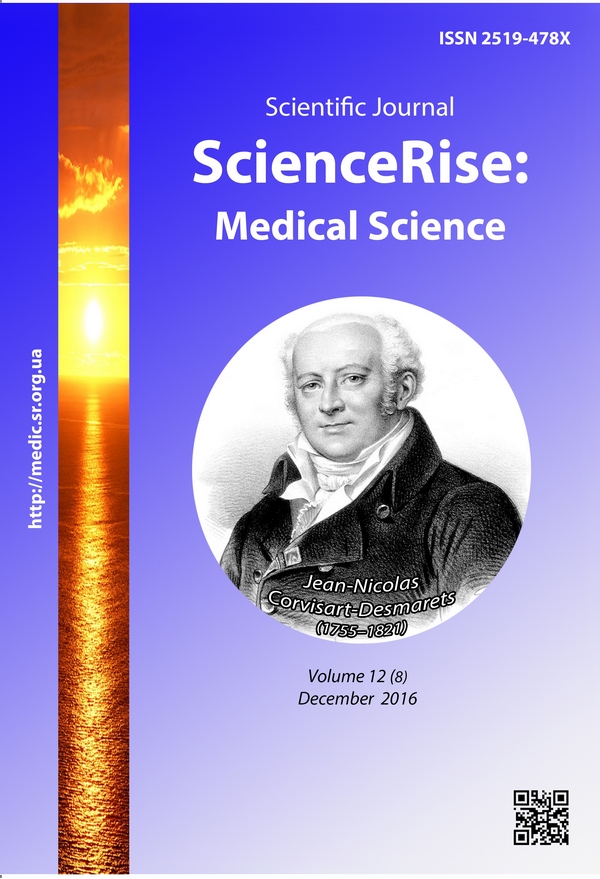Psycho-emotional profile and professional competence of trainees pre-cycle "neurology" in circumstances of the postgraduate education system restructuring
DOI:
https://doi.org/10.15587/2519-4798.2016.86539Keywords:
pre-cycle "Neurology" students, standardized multifactor personality test, professional skills levelAbstract
In order to investigate psycho-emotional profile of neurologists, studying on pre-cycle "Neurology", in circumstances of constant reforms of both medical field, and postgraduate education, their test in writing (51 person) was carried out by standardized multifactor personality test. The given method allowed determining quantitatively and qualitatively (in points) existing psycho-emotional problems of this category of neurologists independently of age, sex and work experience, e.g.: the presence of emotional lability with psycho-astenisation and autisation, as well as reserve mechanisms of adaptation increasing (communicability and expansion of social desirability).
Materials and methods. The additional test of the level of special professional skills in the given group at the beginning and in the end of studying on the 30-day pre-cycle showed a probable improvement of the knowledge level, according to the complex theses data, therefore, it can be argued about the presence of motivational factors in students to expand and to improve their knowledge in specialty during postgraduate training.
Results of the conducted research of neurologists’ psycho-emotional profile have shown the presence of emotional lability with psycho-astenisation and autisation under constant reforms of medical field conditions. Nevertheless, in contrast to the specified profile changes, the adaptive desire of both special knowledge expanding, and active participation in the mentioned changes are formed in modern students.
Conclusion. In order to reduce psychological disadaptation problems manifestation in modern pre-curses students, it should more widely publicize and discuss the advisability of medical field reforms, both in available informational sources for doctors (social and medical publications, journals, associations and specialty societies meetings), and during studying at postgraduate education department. Understanding and appropriate positive perception of the necessity of changes in medical field will reduce effectively anxiety and pessimism among doctors
References
- Stepko, M. F. (2015). Graduate and post- graduate education – the interaction and balance of purposes in modern conditions. ScienceRise, 9/5 (14), 17–21. doi: 10.15587/2313-8416.2015.50828
- Voronenko, Iu. V., Mincer, O. P. (2010). State of Medical Education – evidence of deep reform and non-obvious solutions to problems. Medical Education, 2, 63–65.
- Sibirtsev, V. V. (2015). Modern trends in postgraduate education. Andragogical principles postgraduate education, 134–144. Available at: http://konferenciya.jimdo.com
- Sichkoriz, O. I. (2016). Ways of optimizing continuous professional development in the health reform. Medical Education, 1, 44–46.
- Lotoc’ka-Golub, L. L. (2013). Problem of studying the factors of emotional burnout doctors. Psychological Science, 2/11 (99), 178–183.
- Oliynyk, I. V. (2012). Modern problems of training of doctors during postgraduate education. Medical Education, 4, 111–112. doi: 10.11603/me.v0i4.1359
- Sobchik, L. N. (1990). Standardized multi-factor method of personality research. Methods of psychological diagnosis. Moscow, 78.
- Shevaga, V. M., Payenok, A. V., Zadorozhnyy, A. M., Zadorozhna, B. V. (2013). Some features of psycho-emotional changes in patients with renal encephalopathy. Lviv clinical visnyk, 3 (3), 14–17.
- Straus, S. E., Richardson, W. S., Glaszion, P., Haynes, R. B. (2011). Evidence-based medicine: How to practice and teach it. London: Churchill Livingstone, 305.
- Moskalenko, V. F. (Ed.) (2009). Biostatistics. Kyiv: Book plus, 184.
- Payenok, A. V. (2008). Clinical and paraclinical manifestations of encephalopathy different genesis (early differential diagnosis). Kyiv, 288.
Downloads
Published
How to Cite
Issue
Section
License
Copyright (c) 2016 Angelika Payenok, Орест Євгенович Січкоріз

This work is licensed under a Creative Commons Attribution 4.0 International License.
Our journal abides by the Creative Commons CC BY copyright rights and permissions for open access journals.
Authors, who are published in this journal, agree to the following conditions:
1. The authors reserve the right to authorship of the work and pass the first publication right of this work to the journal under the terms of a Creative Commons CC BY, which allows others to freely distribute the published research with the obligatory reference to the authors of the original work and the first publication of the work in this journal.
2. The authors have the right to conclude separate supplement agreements that relate to non-exclusive work distribution in the form in which it has been published by the journal (for example, to upload the work to the online storage of the journal or publish it as part of a monograph), provided that the reference to the first publication of the work in this journal is included.









